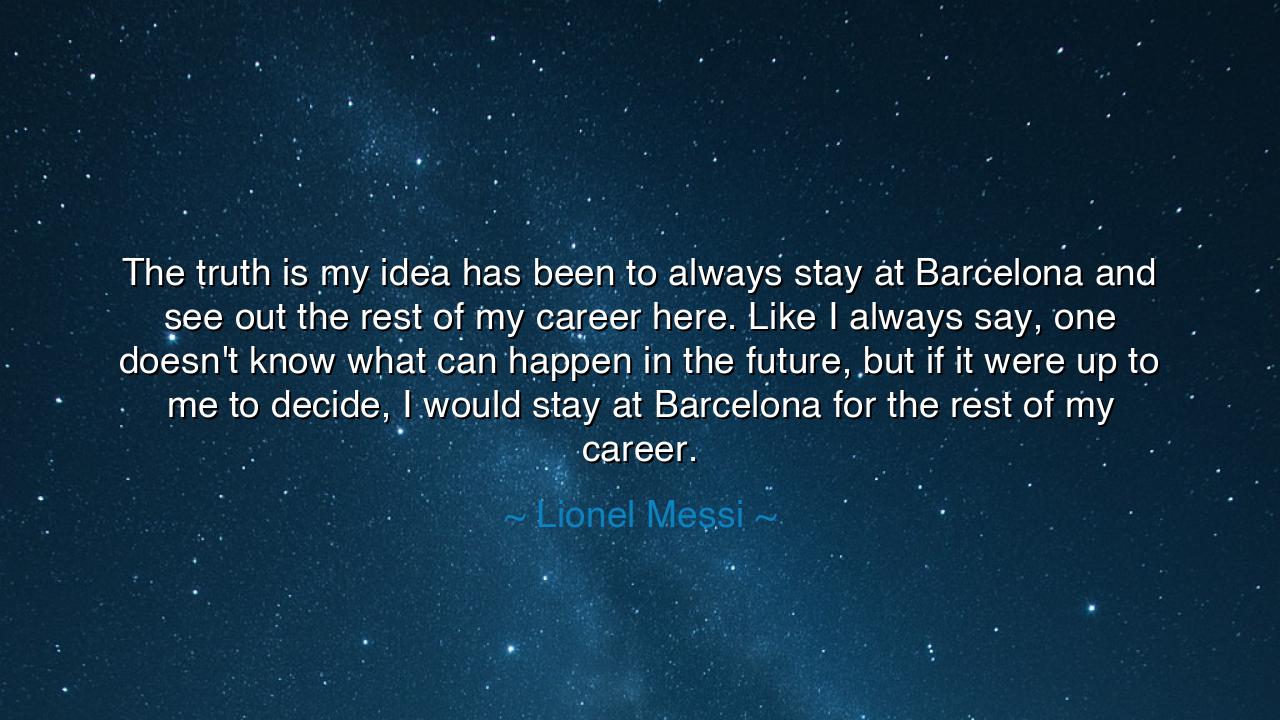
The truth is my idea has been to always stay at Barcelona and see
The truth is my idea has been to always stay at Barcelona and see out the rest of my career here. Like I always say, one doesn't know what can happen in the future, but if it were up to me to decide, I would stay at Barcelona for the rest of my career.






"The truth is my idea has been to always stay at Barcelona and see out the rest of my career here. Like I always say, one doesn't know what can happen in the future, but if it were up to me to decide, I would stay at Barcelona for the rest of my career." These words from Lionel Messi, one of the greatest football players to ever grace the pitch, speak to a deep loyalty, commitment, and devotion to the club that nurtured his talent and made him the icon he is today. In his declaration, Messi captures the essence of a personal journey—not one of transient ambition, but one rooted in steadfastness and a profound desire to remain true to his values and the place that shaped him. Barcelona was not merely his club, it was his home, a symbol of his identity and purpose. To Messi, the idea of leaving Barcelona was not just about changing teams; it was about leaving behind the very essence of who he had become.
In ancient cultures, the notion of loyalty to one's land or city was sacred. Take, for example, Odysseus, the legendary hero of Homer’s Odyssey, who faced numerous trials and tribulations on his journey home to Ithaca. Despite the temptation of immortality and glory on foreign shores, Odysseus' heart longed for his home—the place where his identity was forged, where his life was rooted. Like Odysseus, Messi’s bond with Barcelona was not simply professional but deeply personal, a reflection of his inner self. His desire to stay with the club was not just about career fulfillment; it was about remaining connected to the place where his essence and achievements were intertwined. Messi, like the ancient hero, understood that home is not just where you live—it is where you grow, where you become the person you are meant to be.
But life, as Socrates once said, is not about knowing the future—it is about acting virtuously in the present. Messi, despite his wish to remain with Barcelona forever, acknowledges the uncertainty of the future. Socrates, who dedicated his life to seeking wisdom, reminded his followers that the future is not something we can control or predict. What we can control is how we live in the present, how we approach the unknown. Messi’s words reveal a deep truth about acceptance—that while we may have desires and dreams, we must also embrace the reality that circumstances change, and the future may not always align with our wishes. Just as Socrates embraced his fate without fear, Messi’s acknowledgment of the uncertain future shows a wise acceptance that one must not be bound by rigid expectations but rather adapt with grace to life’s shifts.
This tension between desire and acceptance is further exemplified in the life of Julius Caesar, who, despite his overwhelming ambition, recognized the changing tides of power. Caesar sought to shape his destiny through military and political power, yet even he had to face the inevitable rise and fall of fortunes. At one point, he might have longed to continue his reign as emperor without end, but fate intervened. Like Messi, Caesar had to confront the truth that despite one’s best intentions, the future is shaped by forces beyond one’s control. The lesson is that while we should desire to shape our future, we must also embrace the unpredictability of life’s unfolding narrative.
The key lesson in Messi’s words is one of loyalty and humility—the ability to remain committed to one’s purpose while recognizing that the future is beyond our control. Messi’s journey with Barcelona symbolizes more than just a career in football; it represents a dedication to one’s roots, to staying grounded in one’s values and origins. It teaches us that while it is natural to seek success and stability, we must also be open to the changes that life inevitably brings. It is this balance between aspiration and acceptance that leads to a meaningful life.
In practical terms, Messi’s example calls on each of us to value the places and people that shape us. Whether it is our family, our community, or our work, these are the spaces where we find our purpose and identity. At the same time, we must accept that nothing in life is guaranteed, and change is the only constant. Embrace the people and experiences that define who you are, but also be prepared to adapt as circumstances shift. True fulfillment comes not from clinging to what we know but from finding peace in transition and growth. Just as Messi has embraced both his deep connection to Barcelona and the uncertainty of the future, so too must we navigate life with a sense of loyalty to our values and a readiness to face the unknown with grace.






AAdministratorAdministrator
Welcome, honored guests. Please leave a comment, we will respond soon